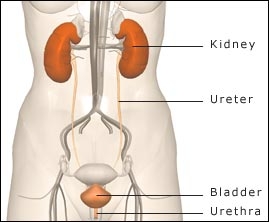In your body, the urinary tract consists of your kidneys (where the urine is formed), bladder
(where urine is collected and stored), and tubes that connect it all to the outside. Many things can cause loss
of bladder control (or incontinence), which can be temporary or ongoing.

Temporary incontinence can result from:
- constipation
- urinary tract infections
- excessive alcohol consumption
- drinking a lot of beverages or drinking fluids that can irritate the bladder, such as carbonated drinks, drinks containing caffeine, citrus fruits and juices, artificial sweeteners, and decaffeinated tea and coffee
- some medications, such as medications to treat the common cold, allergies, depression, pain, blood pressure, or heart conditions; water pills (diuretics); decongestants; and muscle relaxants
Ongoing incontinence can result from:
- an overactive bladder muscle
- obstructions in the urinary tract, such as urinary stones
- weak pelvic floor muscles
- weakness in the urinary sphincter (the valve that controls urine flow)
- a stroke
- bladder cancer
- multiple sclerosis
- Parkinson's disease
- a brain tumour
- spinal cord injuries
- interstitial cystitis (painful bladder syndrome)
- diseases and injuries that affect your nervous system and muscles, such as diabetes
- poor mobility or difficulty in getting around or getting to the toilet
Specific causes in women include:
- vaginal infections or irritation
- pregnancy and childbirth
- hormone imbalance following menopause
- hysterectomy
Specific causes in men include:
- an inflamed prostate, also known as prostatitis, and benign prostatic hyperplasia, (BPH), which refers to swelling of the prostate
- prostate cancer, and treatments for prostate cancer including radiation and surgery
What are the risk factors for incontinence?
There are risk factors for incontinence, many of which you can control. For example, maintaining a healthy weight, not smoking, and reducing your caffeine and alcohol consumption all reduce the risk of incontinence. Why?
- Being overweight, and particularly being obese (a BMI of 30 kg/m2 or higher), causes a constant strain on your bladder and the surrounding muscles. This in turn can result in urine leakage, for example when you cough or sneeze.
- Smoking increases the risk of developing incontinence because it can lead to the development of a chronic cough, which in turn strains the urinary sphincter. Smoking may also cause an overactive bladder due to the effects of nicotine on the bladder wall.
- Caffeine and alcohol consumption increase the risk of incontinence because they are diuretics, which cause the bladder to fill rapidly and to trigger an urgent need to urinate.
Activities such as jogging can also contribute to incontinence, particularly in women, because they put pressure on the bladder, causing temporary urine leakage.
Gender is another risk factor: women are twice as likely as men to experience incontinence because conditions and events such as pregnancy, childbirth, and menopause are all contributing risk factors for incontinence. Women also have a shorter urethra (tube from the bladder to outside).
Advancing age also increases your risk for incontinence, although it is not a condition associated with normal aging. It can result from a weakening of the bladder and muscles surrounding the bladder.






